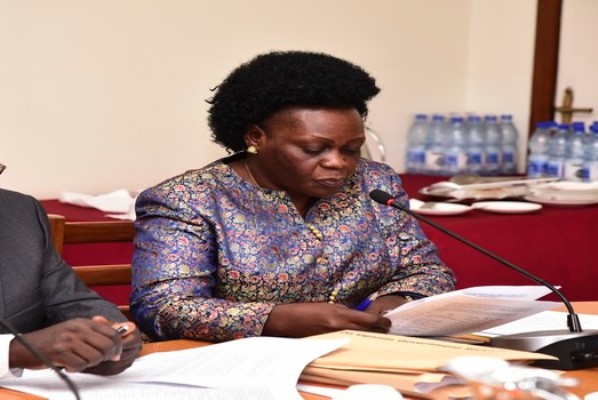Sarah Opendi, UWOPA Chairperson
The Uganda Women Parliamentary Association (UWOPA) have called for the increased funding to the health sector to curb the increasing cases of maternal mortality rates in the country, saying the meager funding has put lives of expectant mothers at risk.
While addressing journalists at Parliament, Sarah Opendi, Chairperson UWOPA revealed that currently, Uganda is still grappling with a high mortality ratio of 336 maternal deaths per 100,000 live births and warned of dire consequences if the challenge isn’t dealt with to save lives of expectant mothers.
“We want to request the Ministry of Health to set up a dedicated medical hotline where women in labour can report all cases of corruption occurring in health facilities. We also call upon government to improve access to quality health care, medicines and necessary supplies so that the marginalized communities can receive healthcare without any challenge,” said Opendi.
According to the 2014 National Demographic Survey, the Life Expectancy in Uganda at birth is 63.3 years and Uganda’s infant mortality rate reduced from 54 per 1,000 live births in 20ll to 43 per 1,000 in 2016. This is the only Millennium Development Goal (MDC) that Uganda achieved. Maternal mortality ratio decreased from 438 per 100,000 live births in 2010 to 336 per 100,000 by 2016.
Opendi added that the problem of meager funding is further worsened by the negligence, delays in accessing health care due to the corruption in health facilities as well as health facilities being far away especially in hard to reach areas.
In September 2021, Minister of Health Ruth Aceng made a statement on state of health service in Uganda, in which she revealed that 86% of the population access healthcare within a 5km radius of a public or private health facility. According to the Ministry of Health’s Health Facility inventory of 2018, there were 6.937 health facilities in Uganda and of these, 3,133 are public and 2,976 private for profit.
The call comes at the time Parliament is expected to scrutunise the report from the Budget Committee on the 2022/2023 budget framework paper whose resource envelop is to a tune of Shs43.083Trn and of this, Human Capital development that includes health and education has been allocated Shs6.172Trn.
The female MPs want the focus that has been given to the fight against Covid pandemic replicated into the fight to reduce mortality rates in Uganda.
Hope Grania Nakazibwe (Mubende DWR) said that most of the mortality deaths in Uganda are preventable but says that it is surprising the health budget has been reduced by over Shs15Bn, a decision that would likely further complicate health service delivery in Uganda.
“Most of them of health care are not enough health workers. So when mother get there don’t find get discouraged after queuing up for hours end up in private clinics,” said Nakazibwe.
The lawmakers therefore recommended that the Ministry of Finance allocates more resources into the healthcare to among others scale up salary shortfalls, shortage of medical supplies and other needs to improve the service delivery in government hospitals.
When Minister Aceng presented the September statement, she informed Parliament that the budgetary allocation to the health sector translates to about US$17 approximately Shs62,900 per capita, yet World Health Organization recommends an allocation of USD34 equivalent to Shs125,800 per person for provision of essential healthcare package exclusive of HIV/AIDS and TB medicines.
The MPs also want increased funding to the human resource in health facilities, to fulfill the 2005 revised staffing norms in the public health facilities. Uganda has 3,133 Public facilities which require human resource of 77,087 personnel, but only 50,135 positions are filled, leaving a shortage of 26,952 medical personnel.





